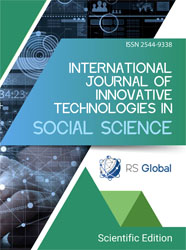STAGES OF RESETTLEMENT OF ECO-MIGRANTS OF ADJARA REGION AND STATE STRATEGY (ON THE EXAMPLE OF GURIA REGION)
Abstract
The modern migration processes in Georgia, especially ecological motives that are caused by the social enviroment have many reasons and they don’t fully corresponds to the socio-economic strategic interests of the development of the country. It is the weak economy mainly due to geographical factors, the backwardness and high cost of the service sector, and the dangerous natural processes that periodically put the need for intensive one-way migration on the agenda. Based on this, the purpose of the study is to determine the nature and stages of ecomigration of the population from the Ajara region at different times in the context of the state strategy, on the example of the ecomigrants settled in the Guria region. In order to achieve the mentioned goal and to study the issue, the institutional approach to the study of migration processes is used. The research is based on quantitative and qualitative social research techniques, as well as analysis and statistical methods. All this helped us in proper analysis and study of collected primary and secondary scientific information and materials. The survey was conducted from March 12 to September 25, 2022. According to the results of the research, in the presented material, the stages of eco-migration from the Adjara region to the Guria region are studied for the first time, its nature is determined, the state policy and its characteristics are evaluated, and various problems related to eco-migration are described. Also, during the research process, we developed recommendations that will contribute to the effectiveness of the state eco-migration policy. Based on the set goal of the research problem and the research issues, the research included the study of the scientific literature surrounding the research problem, the study of state documents, including archival documents, press and media materials, and the implementation of field research in the areas inhabited by ecomigrants.
References
A. of Adjara R. Central State Archives. (abbreviated as Atsa). Fund R-356. anas. 1. St. 104. F. 107.
A. of Adjara R. Central State Archives. Fund R-356. anas. 1. St. 118. F. 15.
A. of Adjara R. Central State Archives. Fund R-356. anas. 1. St. 118. F. 66.
A. of Adjara R. Central State Archives. Fund R-356. anas. 1. St. 287. F. 9
Arango J. (2000). Explaining Migration: A Critical View.Oxford. Blackwell Publishers.
Chumburidze M. Ghvinadze N. Gvazava S. Hosner R. Wagner V. Zurabishvili Tamar. (2015). The State of Migration in Georgia Report developed in the framework of the EU-funded Enhancing Georgia’s Migration Management (ENIGMMA) project. https://migration.commission.ge/files/enigmma-state-ofmigration_e_version.pdf
Ecomigration in Georgia, (2017). Summary document. http://iod.ge/files/Documents/ekoangarishi.pdf
Ecomigration - a challenge for Georgia, (2012). https://netgazeti.ge/life/12317/
Field research materials. (2022). Field ethnographic materials collected as a result of observation of focus group, in-depth interviews in villages inhabited by eco-migrants from Adjara region to Guria region.
Getiashvili R. (2011). Ecomigration Challenges and opportunities in the context of environmental protection, human rights and migration. http://weg.ge/sites/default/files/rezo_getiashvili.pdf
Kniveton D. Schmidt-Verkerk K. Smith Ch. Black R. (2008). Climate Change and Migration: Improving Methodologies to Estimate Flows. IOM Migration Research Series (MRS). https://publications.iom.int/system/files/pdf/mrs-33.pdf
Kukchishvili M. (2020). Eco-migrants who moved from Adjara to Samtskhe-Javakheti and their speech codes.
Yearbook of Kutaisi Public Library.
Legal status of persons/eco-migrants affected by natural disasters and internally displaced persons. (2013). Special report. https://www.ombudsman.ge/res/docs/2019041315541069366.pdf
Lyle J. (2012) Resettlement of Eco-Migrants in Georgia: Current Changes, Trends, Implementation and Perceptions in Resettlement Policy, ECMI Working Paper No. 53, January.
Lyle J. (2012). Resettlement of Ecological Migrants in Georgia: Recent Developments and Trends in Policy,
Implementation, and Perceptions. ECMI WORKING PAPER #53 January 2012. https://www.files.ethz.ch/isn/140733/Working_Paper_53_en.pdf
Macharshvili I. (2008). Forced internal migration in Georgia, problems and ways to solve them, social and environmental aspects. https://greenalt.org/app/uploads/2021/05/woodservice.pdf
Massey D.S. Arango J. Hugo G. Kouaouci A. Pellegrino A. Taylor J.E. (1993). Theories of international migration: A review and appraisal, Population and Development Review, Vol. 19, No. 3, pp. 431-66.
of natural events... (2016). Disaster-affected and displaced (eco-migrant) families: state support and accounting (report prepared by the Democracy Institute). Batumi, Adjara, Georgia.
Putkaradze T. (2006). Historical-ethnological problems of the migration of the population of Chari. Batumi.
Putkaradze T. (2005). Ecological Migrations, Predictions and Prospects. Natural disasters and eco-migrants in Adjara, Proceedings of the conference, Batumi.
Saldadze O. Mushkudiani A. (2018). Adjarian eco-migrants in Tsalka: integration and adaptation strategies. Master thesis. https://www.researchgate.net/publication/333043607_achareli_ekomigrantebi_tsalkashi_integratsiisa_da_adaptatsiis_strategiebi
Silagadze S. (2017). Climate change and migration. http://conferenceconomics.tsu.ge/?mcat=0&cat=arq&leng=ge&adgi=893&title=%E90
Trier T. Turashvili M. (2007). Is resettlement of people displaced by environmental reasons a solution to an existing problem or the creation of a new one? Eco-migration in Georgia 1981-2006. ECMI monografia #6. https://www.files.ethz.ch/isn/39504/monograph_6_geo.pdf
Vashakmadze Kh. (2015). Eco-migration in Georgian and non-status eco-migrants. https://www.kutaisipost.ge/ka/akhali-ambebi/article/18402-ekomigracia-qarthulad-da-ustatusoekomigrantebi
Wood W. Zolberg A. Benda P. (2001). Ecomigration: Linkeages between environmental change and migration, in, Global Migrants, Global Refugees: Problems and Solutions, Berghahn Books, New York.
Views:
413
Downloads:
332
Copyright (c) 2022 Ineza Zoidze, Irakli Manvelidze, Levan Jackeli, Natalia Lazba, Irine Tsintsadze

This work is licensed under a Creative Commons Attribution 4.0 International License.
All articles are published in open-access and licensed under a Creative Commons Attribution 4.0 International License (CC BY 4.0). Hence, authors retain copyright to the content of the articles.
CC BY 4.0 License allows content to be copied, adapted, displayed, distributed, re-published or otherwise re-used for any purpose including for adaptation and commercial use provided the content is attributed.











